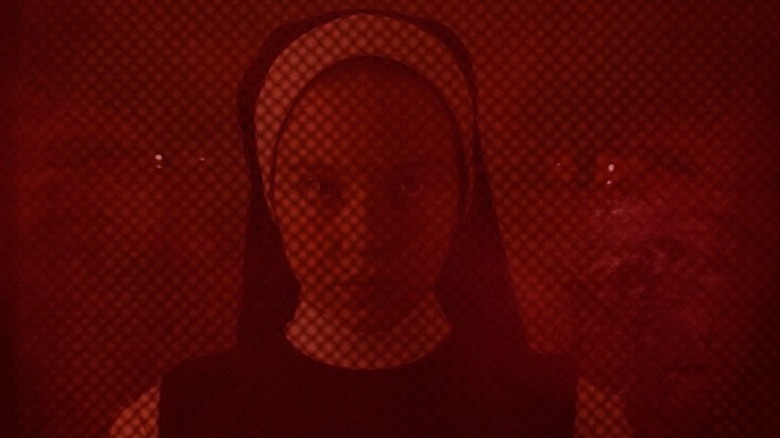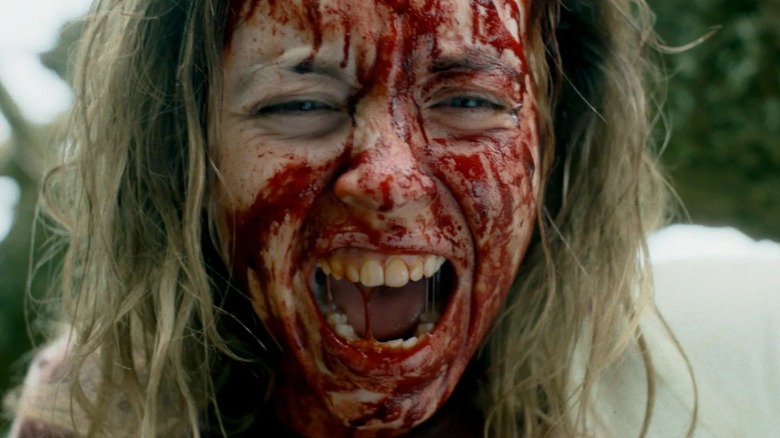Sydney Sweeney's Pregnancy Horror Immaculate Is A Provocative Twist On Rosemary's Baby
This article contains spoilers for "Immaculate."
From the late 1960s to the 1970s, religious horror cinema reigned. Free of the censorious Hays Code, Hollywood could be transgressive again. Americans were generally more Christian 50 years ago than they are today, so scary movies where the horror literally comes from the Devil? Those struck right at the heart of the public.
"Immaculate" is the new convent-set horror film directed by Michael Mohan and starring Sydney Sweeney as the Messiah-bearing Sister Cecilia. It's also a throwback to those mid-20th-century religious horror movies. Yes, "Immaculate" takes narrative beats Dario Argento's witchy giallo "Suspiria" too (though with much earthier lighting) — an innocent American girl flies to Europe and discovers a sinister plot at the communal house she stays in and must narrowly run/fight her way out. As for what that conspiracy is though? "Immaculate" takes more after 1968's "Rosemary's Baby." Mohan thinks so, going as far as to have a poster commissioned to commemorate the connection:
Right after we wrapped, I hired my favorite poster designer Colm Geoghegan (@creepyduckart) to create this gift for our key crew. There are a few fan posters riffing on ROSEMARY'S BABY out there, but this is my favorite: pic.twitter.com/BtPDwCx6kj
— Michael Mohan (@michaelmohan) March 20, 2024
In that movie, pregnant Rosemary (Mia Farrow) slowly discovers that her husband and their neighbors sold her as a broodmare to their lord: Satan. The audience is spared the sight of little antichrist Adrian's red eyes, inherited from his father — but Rosemary isn't. Many religious movies take after "Rosemary's Baby" in documenting the coming of the antichrist, e.g. "The Omen" (and its soon-to-be-released prequel "The First Omen.")
Not "Immaculate" though. The title refers to Immaculate Conception, the tenet that Christ's mother Mary was free of Original Sin and in turn could carry the Son of God while remaining virginal. There are no Satanists in this picture, just classical Catholic fanatics.
When Christ was born
The convent that Cecilia lives in possesses an artifact; one of the nails that pierced Jesus' hands as he was crucified. Father Sal Tedeschi (Álvaro Morte) values it for more than historical purposes; he scraped DNA fragments off it and has been trying to speed along the Second Coming with a clone of Christ. Cecilia's pregnancy is just his latest effort after numerous deformed stillbirths from other "immaculate conceptions."
While Tedeschi and his fellow priests/nuns aren't trying to end the world in a rain of fire and brimstone like the Castevet family in "Rosemary's Baby" (or maybe they are: as Cecilia notes, the Book of Revelation isn't all sunshine and rainbows), they're still sinister. They slowly make Cecilia a prisoner; her carrying their Golden Child for them is not her choice. When she tries to escape, she's tortured. When Sister Gwen (Benedetta Porcaroli) tries to speak up? They take her tongue.
"Immaculate" is about how Christianity and patriarchy are inseparable (for more on this, check out my colleague Bill Bria's pun-tastic explainer on the ending of "Immaculate"). Cecilia's situation, surrounded by men of God who control her every move and value the fetus inside her more than her own life, is an all-too-common one for pregnant women. The third act (or trimester), where Cecilia kills her captors one by one and escapes, is her reclaiming her autonomy. It's fully restored when she gives birth screaming and standing up (performed in one masterful take by Sweeney), then smashes the unholy creation finally expelled from her.
Older religious horror movies like "Rosemary's Baby" and "The Omen" scared us with evils that the Church has been warning us about for centuries. "Immaculate" reminds us how the Church itself can be an evil.
"Immaculate" is now playing in theaters.

